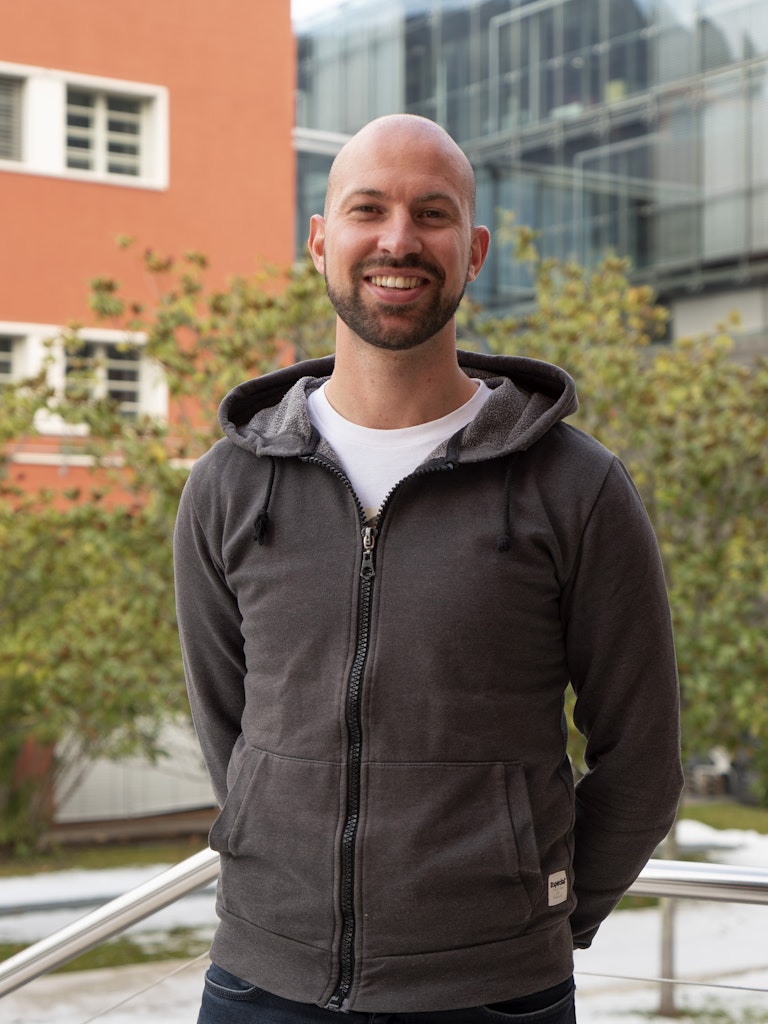magazine_ Interview
Open Research pays off especially for small players
A conversation with limnologist Alberto Scotti
Many funding programs mandate data sharing. Some scientists do it out of obligation, others with great enthusiasm. Alberto Scotti, a young limnologist who studies invertebrates living in freshwater, definitely belongs to the latter category.
For someone in the take-off phase of his career, Alberto Scotti, 31, has some remarkably clear ideas: about the scrupulousness of organizing his work, and about the need to embrace the Open Science approach "without any ifs or buts".
It started with his PhD thesis, for which he examined how climate change and different land uses around Alpine watercourses affect the populations of macroinvertebrates living in the water, and continues in his new each study.
On a day-to-day basis, what does it mean to be an "open researcher"?
Alberto Scotti: It means that I share my work online in two or even three stages. Firstly, I make the data public, i.e. I draw up a list after sampling the rivers, with location, species names, quantities. Then, if my research question is peculiar or the study lasts for quite a long time, I share a so-called "data paper", i.e. I add explanations to the data to put them in context (see an example). I do this for example for all the activities that we carry out with my institute at the Val Mazia long-term ecological research site, Finally, when the scientific paper with analysis and discussion of the data comes out, in addition to the text, I make the entire work process I have done available, step by step.
Tidying up the working papers and making them public: it sounds like extra work. . .
Scotti: Sure, you have to invest some time, but the benefits are exponential. If the data is not organized and explained well, nobody uses it. But if I organize it once, then maybe it's possible to publish two or three more scientific articles with that data set. And this is very important, especially if you are a small player.
Alberto Scotti's PhD thesis is accessible in open mode.
What does it mean that Open Science pays off, especially if you are a small player?
Scotti: You must be honest and figure out who you are, as an institution and as a person, in the international scientific community. If I am a "simple soldier" who does his job very well, I must acknowledge that I cannot go beyond a certain limit. But if I do mine, first and foremost, and share my data, maybe there is a "general officer" out there who sees things that I am not able to see, who has more means than I do, or who is able to do more and better to bring forward scientific knowledge.
But the 'simple soldier' doesn't get any recognition.
Scotti: On the contrary, unthinkable collaborations open up. Thanks to the dataset from our LTER site in Matschtal/Val Mazia, which is probably the only dataset in the world so far that is so complete over a ten-year period, we are about to publish in collaboration with other organizations different papers that we could have never done on our own. In essence, our scientific impact increases by doing the same work as before!
This is in the best of all possible worlds. But if the scientific community is like the rest of the world, isn't there a concern that somebody can steal data and ideas from you?
Scotti: Honestly, I find that the risk of sharing data informally is much higher. The classic case is the email sent in good faith to a trusted person: if they use your data, but do not mention you in their publication, what can you do? Nothing. My data is on the Internet, potentially more 'at risk', but stored in repositories and 'protected' by licenses. Anyone who asks me for anything, I simply send them the link to the repository, and I feel much more protected.
Can reticence be a generational issue? Can we talk of Open Science natives as we talk of digital natives?
Scotti: The world of science is changing so much, and we have to take note of it. Papers with two or three authors no longer exist. And I am convinced that if we all opened up, science too would gain exponentially in credibility, and we would reduce the risk of a growing gap between science and society.
The Winners of the Eurac Research Open Research Award 2021
The main two Open Research Awards went to:
The Group “Language Technologies (LT)” at the Institute of Applied Linguistics whose purview stretches across disciplines, languages and communities and manifests itself in the active participation and coordination of initiatives designed to bring people together, invite them to join in the research and shape best practice. (read the interview)
Johannes Rainer, leader of the Team “Computational Metabolomics” at the Institute for Biomedicine, who has established successful tools and practices for open, collaborative, and reproducible research and whose engagement in a community approach to problem solving are influencing the general attitude of data scientists at the Institute and beyond in the vast R and Bioconductor communities. (read the interview)
The two Awards for Early Career went to:
Alberto Scotti, Institute of Alpine Environment, whose research on aquatic insects as sentinels of environmental changes has been done following the ideal of the open research culture and the aim of sharing every research output.
Giulio Genova, Institute for Alpine Environment, and Mattia Rossi, Institute for Earth Observation, who have collaboratively developed open source tools that help and enable not only researchers but also users with minimal programming skills to access and analyze meteorological and environmental data easily and efficiently. (read the article)

